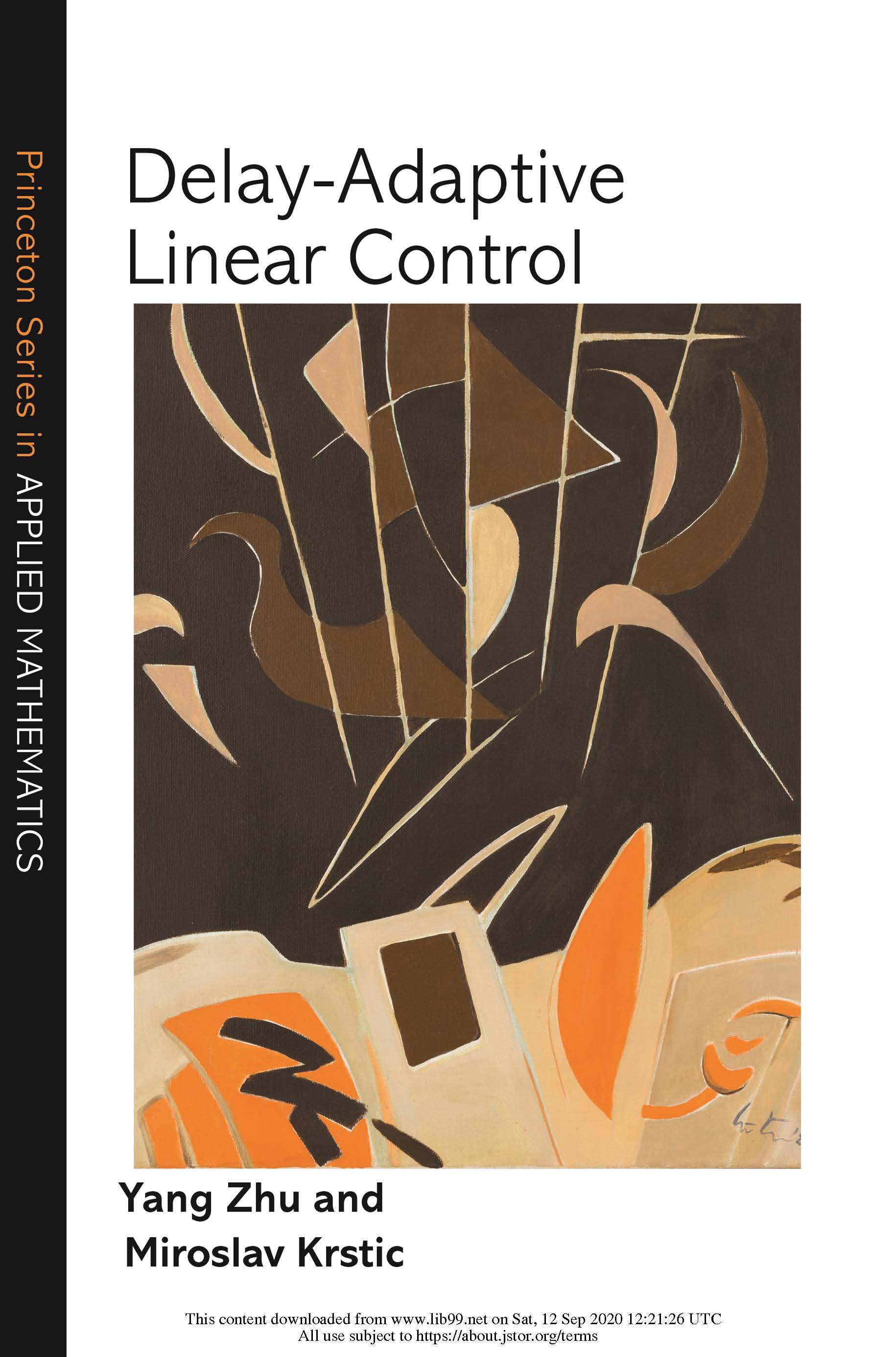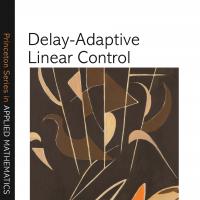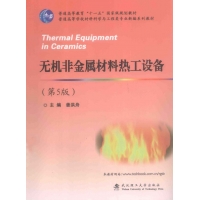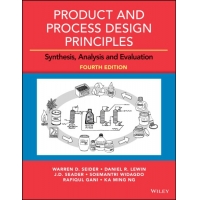Delay-Adaptive Linear Control by Yang Zhu Miroslav Krstic
Yang Zhu
Miroslav Krstic
Series: Princeton Series in Applied Mathematics
Volume: 70
Copyright Date: 2020
Published by: Princeton University Press
DOI: 10.2307/j.ctvrf8c6w
https://www.jstor.org/stable/j.ctvrf8c6w

Book Description:
Actuator and sensor delays are among the most common dynamic phenomena in engineering practice, and when disregarded, they render controlled systems unstable. Over the past sixty years, predictor feedback has been a key tool for compensating such delays, but conventional predictor feedback algorithms assume that the delays and other parameters of a given system are known. When incorrect parameter values are used in the predictor, the resulting controller may be as destabilizing as without the delay compensation. Delay-Adaptive Linear Control develops adaptive predictor feedback algorithms equipped with online estimators of unknown delays and other parameters. Such estimators are designed as nonlinear differential equations, which dynamically adjust the parameters of the predictor. The design and analysis of the adaptive predictors involves a Lyapunov stability study of systems whose dimension is infinite, because of the delays, and nonlinear, because of the parameter estimators. This comprehensive book solves adaptive delay compensation problems for systems with single and multiple inputs/outputs, unknown and distinct delays in different input channels, unknown delay kernels, unknown plant parameters, unmeasurable finite-dimensional plant states, and unmeasurable infinite-dimensional actuator states. Presenting breakthroughs in adaptive control and control of delay systems, Delay-Adaptive Linear Control offers powerful new tools for the control engineer and the mathematician.
eISBN: 978-0-691-20331-7
Subjects: Mathematics, Engineering
Front Matter
(pp. i-iv)
DOI: 10.2307/j.ctvrf8c6w.1
Table of Contents
(pp. v-viii)
DOI: 10.2307/j.ctvrf8c6w.2
List of Figures and Tables
(pp. ix-xii)
DOI: 10.2307/j.ctvrf8c6w.3
Preface
(pp. xiii-xviii)
Yang Zhu and Miroslav Krstic
DOI: 10.2307/j.ctvrf8c6w.4
Acknowledgments
(pp. xix-xx)
DOI: 10.2307/j.ctvrf8c6w.5
List of Abbreviations
(pp. xxi-xxii)
DOI: 10.2307/j.ctvrf8c6w.6
Chapter One Introduction
(pp. 1-16)
DOI: 10.2307/j.ctvrf8c6w.7
Time-delay systems, also called systems with aftereffect or dead-time, hereditary systems, equations with deviating argument, or differential-difference equations [42], are ubiquitous in practice. Some representative examples are found in
chemical industry: rolling mills, milling processes, cooling systems, combustion systems, chemical processes,
electrical and mechanical engineering: networked control systems, teleoperation, robotic manipulators, unmanned aerial vehicles,
biomedical engineering: 3D printing/additive manufacturing, neuromuscular electrical stimulation,
management and traffic science: traffic flow, supply chain, population dynamics.
The most common forms of time delay in dynamic phenomena that arise in engineering practice are actuator and sensor delays [133, 134]. Due to the time it takes...
Chapter Two Basic Predictor Feedback for Single-Input Systems
(pp. 19-34)
DOI: 10.2307/j.ctvrf8c6w.8
In this chapter, we introduce the basic idea of a PDE backstepping approach for single-input LTI ordinary differential equation (ODE) systems with discrete input delay. This chapter is the core for all the developments in the rest of the book. The results in this chapter are obtained under the assumption that all information about the considered systems is known to designer, and they easily (or even trivially) extend to systems with multiple inputs when the delay is the same in all the input channels.
By treating the delayed input as a first-order hyperbolic transport PDE, we transform the LTI-ODE systems...
Chapter Three Basic Idea of Adaptive Control for Single-Input Systems
(pp. 35-57)
DOI: 10.2307/j.ctvrf8c6w.9
In chapter 2, the general class of single-input LTI systems with discrete input delay was taken into account, which is recapped as follows to avoid reading back and forth:
Through the first-order hyperbolic transport PDE state,
the LTI-ODE systems (3.1) could be represented by the following ODE-PDE cascades:
In the control scheme of chapter 2, the full information of the plants (3.3)–(3.5) is assumed to be available. In other words,
the finite-dimensional ODE plant state vector ?(?) is available for measurement,
the infinite-dimensional PDE actuator state ?(?, ?) that represents the delayed input ?(?)...
Chapter Four Single-Input Systems with Full Relative Degree
(pp. 58-83)
DOI: 10.2307/j.ctvrf8c6w.10
At the beginning of chapter 3, we introduced four types of basic uncertainties that usually come with single-input LTI systems with discrete actuator delay:
unknown actuator delay ?, which is allowed to be arbitrarily large,
unknown plant parameter vector ? in system matrix ?(?) and input matrix ?(?),
unmeasurable finite-dimensional ODE plant state ?(?),
unmeasurable infinite-dimensional PDE actuator state ?(?, ?), which represents delayed input ?(?) over the time window ? ∈ [? − ?, ?].
In subsequent sections of chapter 3, we successively dealt with adaptive control problems under uncertainty solely in either ?(?) or ?, and coexistent uncertainties...
Chapter Five Single-Input Systems with Arbitrary Relative Degree
(pp. 84-118)
DOI: 10.2307/j.ctvrf8c6w.11
In chapter 4, we dealt with adaptive control for single-input LTI systems with uncertainty collection (?, ?(?), ?) by assuming that the actuator state ?(?, ?) is measurable. Furthermore, as stated in [88], the relative degree plays an important role in determining the difficulty of the output-feedback adaptive problems, namely, problems involving both unmeasurable ODE state ?(?) and uncertain parameter ? in system and input matrices ?(?) and ?(?). Thus, in chapter 4, the plants of interest were restricted to a class of systems with its relative degree being identical with its system dimension. In this chapter, we remove this...
Chapter Six Exact Predictor Feedback for Multi-Input Systems
(pp. 121-133)
DOI: 10.2307/j.ctvrf8c6w.12
In part I, we investigated adaptive control problems of uncertain single-input LTI systems with discrete input delay, and the results obtained seem to easily (or even trivially) extend to systems with discrete multiple inputs when the delay is the same in all the input channels. In part II, we consider adaptive control problems of multi-input LTI systems with distinct discrete input delays; i.e., each delay length in several multi-input channels is not the same. The problem of distinct delays significantly complicates the prediction design, as it requires one to compute different future state values on time horizons, making this computation...
Chapter Seven Full-State Feedback of Uncertain Multi-Input Systems
(pp. 134-168)
DOI: 10.2307/j.ctvrf8c6w.13
In chapter 6, under the assumption of a perfect prior knowledge of the system, a PDE-based framework of exact predictor feedback for multi-input LTI systems with distinct discrete input delays was proposed. On the basis of that, in this chapter, we investigate adaptive control for uncertain multi-input LTI systems with distinct discrete actuator delays. In parallel with the single-input case in chapter 3, four types of basic uncertainties come with multi-input LTI time-delay systems:
the finite-dimensional ODE plant state vector ?(?) is unavailable for measurement,
the infinite-dimensional PDE actuator state ??(?, ?) for ?=1, …, ?, which represents the distinct...
Chapter Eight Output Feedback of Uncertain Multi-Input Systems
(pp. 169-198)
DOI: 10.2307/j.ctvrf8c6w.14
In chapter 7 we solved the problem of adaptive stabilization in the presence of distinct discrete multiple actuator delays that are long and unknown, under the assumption that the actuator state in each input channel is available for measurement. In this chapter this assumption of measurable actuator state is removed, as shown in table 7.1.
Similar to the case of single-input delay, the result of multi-input delays that we obtain in this chapter is not global, as we do not believe the problem where the actuator state is not measurable and the delay value is unknown at the same time...
Chapter Nine Output Feedback of Systems with Uncertain Delays, Parameters, and ODE State
(pp. 199-216)
DOI: 10.2307/j.ctvrf8c6w.15
In chapter 8 we solved the problem of adaptive stabilization of multi-input LTI systems under the assumption that distinct discrete multiple actuator delays are long and unknown, and the actuator state in each input channel is unavailable for measurement. A local stabilization result is achieved. In this chapter, as shown in table 7.1, we consider the more challenging case where uncertainties exist not only in the input delay and the PDE actuator state, but also appear in the ODE plant state and the parameters of the system and input matrices. To be specific, the uncertainty collections (??, ??(?, ?), ?(?))...
Chapter Ten Predictor Feedback for Uncertainty-Free Systems
(pp. 219-234)
DOI: 10.2307/j.ctvrf8c6w.16
In parts I and II, we investigated predictor control problems of uncertain single-input or multi-input LTI systems with discrete input delays. In this part, we extend the predictor method to compensate for another big family of delays—distributed input delays.
The control designs for unknown discrete input delays in parts I and II are not applicable to the case of unknown distributed input delays, as the plant and actuator states are not in the strict feedback form. In this part, we presents a new systematic method to stabilize uncertain LTI systems with distributed input delays.
First of all, in order...
Chapter Eleven Predictor Feedback of Uncertain Single-Input Systems
(pp. 235-266)
DOI: 10.2307/j.ctvrf8c6w.17
The single-input linear system with distributed input delay in section 10.1 is recapped as follows:
which can be represented by the following ODE-PDE cascade:
As clarified in the last chapter, if we concentrate on (11.1)–(11.2) and its conversion (11.3)–(11.6), a single-input linear plant with distributed actuator delay comes with the following five types of basic uncertainties:
unknown delay ?,
unknown delay kernel ?(??),
unknown parameters in the system matrix ?,
unmeasurable finite-dimensional plant state ?(?),
unmeasurable infinite-dimensional actuator state ?(?, ?).
In this chapter, we present the predictor feedback for uncertain single-input...
Chapter Twelve Predictor Feedback of Uncertain Multi-Input Systems
(pp. 267-292)
DOI: 10.2307/j.ctvrf8c6w.18
The multi-input linear system with different distributed input delays in section 10.2 is recapped as follows:
which can be represented by the following ODE-PDE cascade:
If we concentrate on the system (12.3)–(12.6), a finite-dimensional multi-input linear system with distributed actuator delays comes with five types of basic uncertainties:
unknown and distinct delays ??,
unknown delay kernels ??(??(1 − ?)),
unknown system matrix ?,
unmeasurable finite-dimensional plant state ?(?),
unmeasurable infinite-dimensional actuator state ??(?, ?).
Based on the predictor feedback framework for uncertainty-free multi-input systems in section 10.2, in this chapter, we present the...
Appendix A
(pp. 293-295)
DOI: 10.2307/j.ctvrf8c6w.19
Appendix B
(pp. 296-302)
DOI: 10.2307/j.ctvrf8c6w.20
Appendix C
(pp. 303-313)
DOI: 10.2307/j.ctvrf8c6w.21
Appendix D
(pp. 314-316)
DOI: 10.2307/j.ctvrf8c6w.22
Bibliography
(pp. 317-330)
DOI: 10.2307/j.ctvrf8c6w.23
Index
(pp. 331-332)
DOI: 10.2307/j.ctvrf8c6w.24
![]()
1、本站所有分享材料(数据、资料)均为网友上传,如有侵犯您的任何权利,请您第一时间通过微信(lib99net)、QQ(24661067)、电话(17898078618)联系本站,本站将在24小时内回复您的诉求!谢谢!
2、本站所有商品,除特殊说明外,均为(电子版)Ebook,请购买分享内容前请务必注意。特殊商品有说明实物的,按照说明为准。
![]()

![]()
1、自动:在上方保障服务中标有自动发货的宝贝,拍下后,将会自动收到来自卖家的宝贝获取(下载)链接;
2、手动:未标有自动发货的的宝贝,拍下后,卖家会收到邮件、短信提醒,也可通过QQ或订单中的电话联系对方。
![]()
1、描述:书籍描述(含标题)与实际不一致的(例:描述PDF,实际为epub、缺页少页、版本不符等);
2、链接:部分图书会给出链接,直接链接到官网或者其他站点,以便于提示,如与给出不符等;
3、发货:手动发货书籍,在卖家未发货前,已申请退款的;
4、其他:如质量方面的硬性常规问题等。
注:经核实符合上述任一,均支持退款,但卖家予以积极解决问题则除外。交易中的商品,卖家无法对描述进行修改!
![]()
1、在未购买下前,双方在QQ上所商定的内容,亦可成为纠纷评判依据(商定与描述冲突时,商定为准);
2、在宝贝同时有网站演示与图片演示,且站演与图演不一致时,默认按图演作为纠纷评判依据(特别声明或有商定除外);
3、在没有"无任何正当退款依据"的前提下,写有"一旦售出,概不支持退款"等类似的声明,视为无效声明;
4、虽然交易产生纠纷的几率很小,但请尽量保留如聊天记录这样的重要信息,以防产生纠纷时便于网站工作人员介入快速处理。



 人工在线查找书籍,不要问我们有什么,告诉我们您需要什么即可...¥1.00
人工在线查找书籍,不要问我们有什么,告诉我们您需要什么即可...¥1.00 【PPT】Linear Algebra and Its Applica...¥0.1
【PPT】Linear Algebra and Its Applica...¥0.1 Delay-Adaptive Linear Control by Ya...¥29.99
Delay-Adaptive Linear Control by Ya...¥29.99 Handbook of Organic Materials for E...¥19.99
Handbook of Organic Materials for E...¥19.99 FinFET Devices for VLSI Circuits an...¥29.99
FinFET Devices for VLSI Circuits an...¥29.99 Positron Beams and Their Applications¥29.99
Positron Beams and Their Applications¥29.99 ASM Handbook Volume 11A Analysis an...¥420.00
ASM Handbook Volume 11A Analysis an...¥420.00 PETSc for Partial Differential Equa...¥29.99
PETSc for Partial Differential Equa...¥29.99 无机非金属材料热工设备-作 者 : 姜洪舟主编 2015第5版...¥14.99
无机非金属材料热工设备-作 者 : 姜洪舟主编 2015第5版...¥14.99 Product and Process Design Principl...¥9.99
Product and Process Design Principl...¥9.99